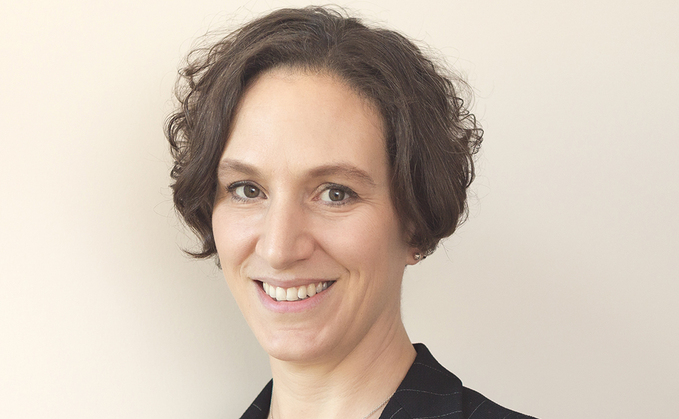
Key points
- Smart is looking to increase the focus on being saver-centric
- TPR will pioneer diversity internally, externally, and more widely among savers
- A new and fairer process for recruiting is currently being used
In June, The Pensions Regulator (TPR) set out a bold new statement on its plans to lead by example across the industry, with a deep dive into its culture, response and workings around diversity and inclusion (D&I).
The regulator's equality, diversity and inclusion (EDI) strategy was published just six weeks after Sarah Smart took up the role of chair.
It wanted the strategy to be ambitious, significant, and to inspire change at a time when the pensions industry, like all others, is alive to the pressure to be both fair and inclusive.
Smart - TPR's preferred choice for the chair position - pledged to shape it into one that could pave the way for a more inclusive culture across the whole industry.
While TPR has had a female chief executive, Smart is the first woman to be appointed as chair. She first joined the board five years ago, noting she has "been part of the journey so far to be a ‘clearer, quicker and tougher' regulator" - one that is unafraid to be bold and innovative in its approach to policymaking.
Key to Smart's vision for the regulator and its work is an unquestionable saver-centric approach to all decision making, echoing the overarching theme of TPR's 15-year corporate strategy, which was released last October.
"I'm trying to set out this real golden thread between our analysis of how we see the landscape and risks to the savers, how we quantify those risks, and then how we allocate and prioritise our regulatory resource and our regulatory tools to minimise those risks as much as possible," she explains.
Experienced chair
Position: Sarah Smart is chair at The Pensions Regulator, having held the role in an interim capacity in April and May of 2021 before assuming it formally in June.
Previously: She was an independent investment and funding committee member of the Unilever UK Pension Scheme between 2018 and 2021, independent chair of the Financial Times Governance Committee between 2016 and 2021, adviser to the Lothian Pension Fund between 2013 and 2018, and was independent chair of TPT Retirement Solutions from 2010 to 2018. Smart has also held non-executive roles with Big Society Capital, UK Athletics, Social Investment Scotland, and has also held trustee roles with the London Pensions Fund Authority, Macmillan Cancer Support Pension Scheme, Scottish Pension Trustees, and was a member-nominated trustee of the Standard Life Pension Scheme. Smart was investment director at Standard Life Investments between 1999 and 2008, and manager at PwC between 1995 and 1999
"And then being very clear and transparent about how we measure our success in doing that and how we measure the outcomes that we have."
Smart is sensitive to industry sentiment and firm on her intention to avoid the regulator's saver-first focus being reduced to sounding "like a good strapline".
"It's a change to how we think about what we do at the regulator and how we think about what we're delivering," she says. "When we come to think about initiatives like the defined benefit funding code, or something like climate change, it's not just ‘here's a piece of legislation, let's implement it', it's ‘what are we trying to achieve for savers by this initiative and what we're implementing here?'"
Consideration from the savers' perspective, or what Smart calls "saver thinking", will therefore be central to how TPR assesses whether it has delivered and achieved that outcome.
Debunking diversity
All the evidence, Smart says, suggests that having a fair, diverse and inclusive organisation and environment is the way to making sure the best decisions for savers are made. For this reason, the regulator's EDI strategy is set to play a pivotal role in how the regulator grows its position in the future.
"There are three strands to our strategy," Smart explains. "One is for us to be a fair, diverse and inclusive employer. Second is to ensure that the governing bodies within the industry are made up of diverse individuals, and are inclusive. Thirdly, to look at how pensions inequality exists within the system in the UK, and what they ways that we can work together to reduce those are."
The regulator's five volunteer networks - disability, minority ethic, LGBT+ network, women's, and mental health - were key to collating employers' views for inclusion within the strategy as it was being developed.
"The way we developed the strategy was to set up a sub-committee of the executive committee, chaired by two members of the executive team and also supported in what it was looking at by these individuals from across our networks within TPR."
She adds: "We also talked to colleagues externally within the regulatory network around the issues both within the wider financial system within the UK and within our organisations as regulators. We sought input from all those different areas, and it's important then that we settled on a strategy that's internal, that's for us as a regulator, but external and looks at our regulated industry and diversity within that."
Inaugurating internally
Key to the successful delivery of any strategy is a well-formulated plan to ensure staying on track. For the regulator, this means the formation of a specialist working group to oversee the development of the first part of the EDI strategy - the internal look at the organisation itself.
"We have plans and goals for our internal TPR targets in terms of diversity as an employer, as well as targets for that within TPR that we will report on. We are challenging the working group and working with it to come up with an action plan in terms of what we think is realistic."
Smart is conscious that changes cannot be made overnight, but stresses that her development of D&I-related initiatives that improve the customer journey and raise the profile of pension saving will be a continuous part of her story.
"We don't have to be really short-term," she says of TPR's targets and goals. "It's hard work doing something that new for the first time and changing the status quo. But at the end of it, people within TPR frequently hear me ask ‘what are we trying to achieve and how are we going to measure whether we have been successful?' And I think this is exactly the same.
"There's no point in doing something if we can't measure whether we're making a difference and making progress towards our goal."
Challenging conventions
Lack of a good baseline of data makes the second part of the regulator's strategy - ensuring that the governing bodies within the industry are diverse and inclusive - particularly complex.
Smart says the regulator does not currently collect D&I information on the age or ethnicity of trustees making it difficult to police whether boards are reflecting the makeup of their savers.
"This is something for the industry working party to consider - how it's appropriate to collect that data and to measure progress in that area," she says.
For now, the focus remains on the continuous promotion, expectation and communication of D&I values and benefits.
Another sticking point is that no action can ever be quite repeated in the same context more than once, Smart says. Tangible demonstrations of the benefits of D&I in practice are therefore thin on the ground.
"It's very difficult to put two pieces of action side by side and say ‘well I can categorically show that this process created a more diverse board than this process and here are some better decisions'," Smart admits.
"We have to be robust and keep plugging away with it," she says. "There is evidence that says more diverse boards and more diverse governance groups make better decisions. As there is evidence to support that, we ask people to inform themselves of it, and to follow that journey."
Reimagining recruitment
A new type of non-executive (NED) recruitment - which looks to better equalise candidates - is already in the regulator's pipeline so it can meet its overall EDI strategy objective to lead the industry by example.
The regulator is currently looking to bolster its NED headcount using this new approach.
Smart says: "We want all sorts of diverse candidates to apply, and we're including some aspects in that process - both in terms of holding an information session and then in terms of how we select the candidates - that we haven't done before, it's the first time of doing it."
If the regulator is prepared to do this work, Smart believes it will be "easier to be able to persuade others to be prepared to do it".
"I'm doing the regulator's NED recruitment in a way that introduces more inclusivity, equality and diversity and I know it's hard work, but it is what we owe to our fellow colleagues within the industry, to treat everybody in this way," she states.
"If that means a little bit of extra effort for some, then I would just tell them that that effort is probably well worth putting in."
Working widely
The social impacts of the Covid-19 pandemic have been some of the most contentious effects felt.
With the Work and Pensions Committee currently also consulting on how effective pension freedoms were at widening the industry's reach to all savers in the first five years - opportunities to embrace D&I in all corners of the industry are ripe.
Alongside TPR chief executive Charles Counsell, Smart keeps abreast of the developments other regulators are making in the D&I space through TPR's involvement in the UK Regulators Network.
While there is no formal collaboration on D&I with other regulators, Smart says she looks at how other regulators face the issue that present themselves, and tries to onboard that learning at TPR.
Recruitment and supervision are key areas where Smart believes that a difference can be made.
"I think within our regulated area, we are getting better at gender diversity. Financial services and pensions within it has fallen into the trap of looking ‘male, pale, and stale' perhaps, but gender diversity is improving," she observes. "Age diversity has further to go and is really important, and ethnic diversity is barely out of the blocks."
Who TPR thinks is fit and proper to run schemes, master trusts and superfunds is where Smart is hoping to change the mould.
"We don't fall into the trap of saying someone has to have 30 years' experience in the pensions industry to fit our ideal," she says. "If we do that, we will be regulating in a way that works against diversity rather that promotes it."
Thinking about how those authorised can have the right skills and capabilities without necessarily fitting a certain model is where Smart sees other regulators struggling.
She explains: "It's not about necessarily what someone looks like but about diversity of thought and how people think. The absolute goal and aim we're all trying to get to is diversity of thought, and making sure that we bring that, and it helps us to make good decisions.
"It is likely that if you have a group of individuals around a table who all think slightly differently from each other, they will look different to each other as well."
Yet Smart is conscious of the challenges trustees face. Avoiding groupthink is difficult, she notes, drawing on an example of her own experience starting as a NED aged 32, and a trustee three years later.
"I have sat on investment committees where we have had a reasonable amount of gender diversity and a reasonable amount of age diversity but we've all been institutional investors and we've all learnt in the same system," she says. "It's not just as simple as we'll get the gender diversity, we'll get the age diversity, we'll get ethnic diversity and other forms, we have to really pay attention to what backgrounds people come from, what educational systems, training systems they come from, to make sure people think in different ways."
Tempering trustees
A temporary rethink on business as usual operations during the last year has left the regulator with a swathe of work to synthesise and present.
D&I is just one slice of the pie as the regulator pushes forward in its ever busy mission to reach savers from the inside of the industry out.
The Investment and Savings Alliance came forward in July highlighting its members' concerns over industry consultations, arguing tight deadlines and high expectations were burdening trustees.
The criticism - aimed at regulators and the government - was echoed in PP's own research the same month. When trustee, analyst, administrator, lawyer, and consultant respondents to a questionnaire asking whether they felt they were drowning under a deluge of consultations, almost three quarters (73%) said they were.
Smart says TPR recognises the significant amount of change the pensions industry is experiencing, acknowledging things are "quite lumpy and often come in waves".
"It is because of the pattern of how we get legislation through, and then it all comes in a big chunk which can feel tiring a bit exhausting for people to cope with that burden of change. We recognise it, and we will try and work with the industry as much as possible to ease the delivery of that."
Smart continues: "However, I think it's fair to say that we as a regulator and we as an industry need to change just at the same pace as the landscape is changing, in order to make sure we continue to deliver good outcomes for the savers."
Part of this change is the plethora of initiatives, charters, groups and initiatives around D&I in particular have entered the pensions space in the last few years. However, PP research last month found three quarters of schemes are not aligned to, or a member of, any sort of initiative linked to industry diversity.
Yet amid the ever growing ‘to-do' list for those in the pensions space, time spent on getting D&I right will be fundamentally important to all under the regulators remit, Smart concludes. And to the naysayers looking for constant proof that attention on it is not time wasted away from pivotal work - a nutshell overview: "If we don't have equality in terms of giving access to people and giving people access to opportunities, we don't get diversity ," Smart says. "When we talk about just diversity, we talk about all of the three - diversity, equality, and inclusion - together. If we don't get inclusion and inclusivity, we don't reap any benefits from diversity."









